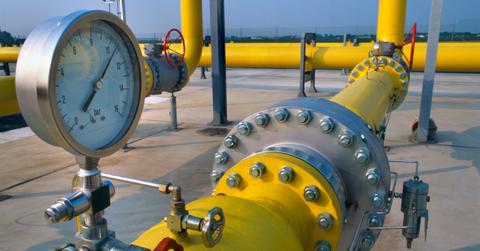What the EPA's Proposed Methane Regulations Would Mean for the Planet
The EPA is proposing less strict regulation of the oil and gas industry.
Updated Aug. 29 2019, 2:00 p.m. ET

While so many environmentalists are doing their best to combat methane emissions, the U.S. government seems to be doing the opposite. On Thursday, Aug. 29, the Environmental Protection Agency will reportedly announce new regulations for the oil and gas industry's treatment of methane, The Wall Street Journal revealed Thursday morning. Methane, a harmful greenhouse gas that significantly contributes to the climate crisis, will be more susceptible to leaks into the atmosphere under the new rules.
Read on for everything you need to know about the legislation, what it would mean for the planet, and what you can do about it.
What Are the EPA's New Methane Regulations?
Under the Trump administration, the EPA is suggesting the U.S. get rid of regulations put in place by the Obama administration. The proposed regulations would no longer require oil and gas companies to use technology that monitors and and repairs methane leaks, according to The New York Times . Currently, these companies are required to install this technology in all wells, pipelines, and methane storage areas.
If the legislation passes, these companies will no longer be required to keep an eye on and fix methane leaks, meaning more methane could leak into the atmosphere. The New York Times says these regulations won't be put in place until early 2020, assuming they pass the necessary reviews.
What Is Methane?
Methane is a strong greenhouse gas — on average, methane is 30 times more potent than CO2, according to Science Daily. But methane can actually warm the Earth up to 86 times more than CO2 can, according to the IPCC via Scientific American.
Methane traps heat in the atmosphere, causing the Earth's temperature to rise. But due to so much extra methane (and other greenhouse gases) in the atmosphere from various human activities, the Earth is heating up more than it should.
How Does Methane Enter the Atmosphere?
Methane most commonly enters the atmosphere from a variety of human activities — for example, livestock (namely cows) emit methane via their belches, and rotting trash in landfills emits methane. For those reasons, reducing your consumption of animal products and the amount of trash you produce are great ways to lower your impact. However, according to the Environmental Defense Fund, the biggest source of methane emissions is the oil and gas industry.
What Do the EPA Methane Regulations Mean?
As noted above, the soonest these regulations would go into effect is early next year. However, as Politico explained, EPA Administrator Andrew Wheeler has proposed doing away with these regulations in the past, and it has not panned out — so there's a chance that Wheeler will not be able to turn the regulations into law.
However, if the regulations do go into effect, it could have significant effects on the climate crisis. The regulations mean oil and gas companies would not be required to identify and deal with methane leaks in an efficient way, meaning there would be a risk of more methane entering the atmosphere, which would trap more heat, deepening global warming and the climate crisis. If we want to achieve the Paris Agreement's goal of keeping the global temperature rise below 2 degrees Celsius, we need to limit methane emissions — not risk more methane entering our atmosphere.
What Are Experts Saying About the New EPA Methane Regulations?
The New York Times spoke with Rachel Kyte, the United Nations special representative on sustainable energy, to learn more about what the regulations could mean. “This is extraordinarily harmful,” Kyte told the newspaper. “Just at a time when the federal government’s job should be to help localities and states move faster toward cleaner energy and a cleaner economy, just at that moment when speed and scale is what’s at stake, the government is walking off the field.”
Acccording to Politico, environmental law nonprofit Earthjustice plans to sue the EPA if this new regulation really goes into effect next year.
What Does the Oil and Gas Industry Think?
Interestingly, some major oil and gas groups have said that they don't mind the current regulations — in fact, a BP America exec even called the regulations "essential" in an op-ed for the Houston Chronicle. But that may simply be because they can afford these measures.
As The New York Times noted, the Independent Petroleum Association of America would like to see the regulations done away with, because the technology required is often too expensive for small, independent oil and gas companies. Perhaps one reason that larger oil and gas companies have expressed support of the regulation is because it could put smaller companies who can't afford the technology out of business.
What Can We Do About This?
If you don't want to see these regulations go into effect, you can write to your representative and ask them to oppose them. You can also reduce your intake of animal products, single-use plastic, and the amount of trash you produce, since all those activities emit methane, and encourage your friends and family to do the same.